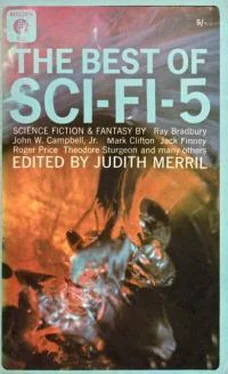The Best of Sci-Fi-5
Здесь есть возможность читать онлайн «The Best of Sci-Fi-5» весь текст электронной книги совершенно бесплатно (целиком полную версию без сокращений). В некоторых случаях можно слушать аудио, скачать через торрент в формате fb2 и присутствует краткое содержание. Год выпуска: 1966, Издательство: Mayflower-Dell, Жанр: Фантастика и фэнтези, на английском языке. Описание произведения, (предисловие) а так же отзывы посетителей доступны на портале библиотеки ЛибКат.
- Название:The Best of Sci-Fi-5
- Автор:
- Издательство:Mayflower-Dell
- Жанр:
- Год:1966
- ISBN:нет данных
- Рейтинг книги:3 / 5. Голосов: 1
-
Избранное:Добавить в избранное
- Отзывы:
-
Ваша оценка:
- 60
- 1
- 2
- 3
- 4
- 5
The Best of Sci-Fi-5: краткое содержание, описание и аннотация
Предлагаем к чтению аннотацию, описание, краткое содержание или предисловие (зависит от того, что написал сам автор книги «The Best of Sci-Fi-5»). Если вы не нашли необходимую информацию о книге — напишите в комментариях, мы постараемся отыскать её.
The Best of Sci-Fi-5 — читать онлайн бесплатно полную книгу (весь текст) целиком
Ниже представлен текст книги, разбитый по страницам. Система сохранения места последней прочитанной страницы, позволяет с удобством читать онлайн бесплатно книгу «The Best of Sci-Fi-5», без необходимости каждый раз заново искать на чём Вы остановились. Поставьте закладку, и сможете в любой момент перейти на страницу, на которой закончили чтение.
Интервал:
Закладка:
“Dammit, boy! Tomorrow I’ll take you to the City and let you answer your own questions!”
And I did. Sue protested and old Sato just gave me that look which said, “I’m not saying anything,” but I did.
The journey to the City is necessarily one which goes from bad to worse. As a deer and a man in the wilderness look for downward paths and lush places if they would find a river, the signs which lead to the centers of human civilization are equally recognizable.
You look for ugliness and senselessness. It is that simple. Look for places which have been overlaid with mortar so that nothing can grow or change at its will. Look for things which have been fashioned at great expense of time and energy and then discarded. Look for tin and peeling paint, for rusted metal, broken neon tubing, drifts and drifts of discarded containers—cans, bottles, papers. Look for flies and let your nose lead you where it would rather not go.
What is the difference between the burrow of a fox and a huge sheet-metal hand which bears the legend, in peeling, garish paint: THIS WAY TO PERPETUAL PARMENIDEAN PALACES … ? I do not know why one is better than the other, or if it is. I know that present purposes— purposes of intellect—lead one way, and intuition leads the other. So we resist intuition, and the path of greatest resistance leads us from one vast, crumbling, frequently stinking artifact or monument to another.
Chris is alternately nauseated and thrilled. He wants to stay in the palatial abandoned houses in the outskirts, but I say “no.” For one thing, the rats look like Doberman Pinschers and for another … well, never mind what it is that repels me.
Much of the city looks grand until we come close enough to see where cement and plaster, paint and plastic have sloughed away to reveal ruptured tubes and wires which gleam where their insulation has rotted away, and which are connected to nothing with any life in it. We follow a monorail track which is a silver thread seen from a distance, but which has a continuous ridge of rust and bird droppings along its upper surface as far as the eye can see. We see more of the signs which point to the PERPETUAL PARMENIDEAN PALACES, and we follow them, giving our tormented intuition a rest even while for our eyes and our spirits there is no relief.
When we first encounter life we are not sure that it is life.
“They look like huge grapes!” exclaims Chris when we find them, clustered about a central tower in a huge sunken place like a stadium. The P. P. Palaces are indeed like huge grapes—reddish, semitransparent, about fifteen feet in diameter, or perhaps twenty. I am not used to measuring spaces in such terms any more. The globes are connected to the central tower, or stem, by means of thick cables … their umbilicals. A high, wire-mesh fence surrounds the area, but here and there the rust has done its work in spite of zinc coating on the wire. With the corn-knife I have brought to defend us from the rats and God knows what, I open a place in the fence. We are trespassing, and we know this, but we have come this far.
“Where are the people?” asks Chris, and I see that he looks pale. He has asked the question reluctantly, as though preferring no answer. I give none. We come close to one of the spheres, feeling that we do the wrong thing and doing it anyway. I see our objective and I point. It is a family of them, dimly visible like floating plants in an un-cleaned aquarium. It is their frightened eyes we first see.
I do not know very much about the spheres except from hearsay and dim memory. The contents, including the occupants, are seen only dimly, I know, because the outer skins of the thing are filled with a self-replenishing liquid nutrient which requires the action of the sun and is augmented by the waste-products of the occupants. We look closer, moving so that the sun is directly behind the sphere, revealing its contents in sharper outline.
“Those are not real people,” says Chris. Now he looks a little sick. “What are all those tubes and wires for if they’re real people? Are they robots or dolls or what?”
I do not know the purpose of all the tubes and wires myself. I do know that some are connected with veins in their arms and legs, others are nutrient enemata and for collection of body wastes, still others are only mechanical tentacles which support and endlessly fondle and caress. I know that the wires leading to the metal caps on their heads are part of an invention more voracious and terrible than the ancient television—direct stimulation of certain areas of the brain, a constant running up and down the diapason of pleasurable sensation, controlled by a sort of electronic kaleidoscope.
My imagination stops about here. It would be the ultimate artificiality, with nothing of reality about it save endless variation. Of senselessness I will not think. I do not know if they see constantly shifting masses or motes of color, or smell exotic perfumes, or hear unending and constantly swelling music. I think not. I doubt that they even experience anything so immediate and yet so amorphous as the surge and recession of orgasm or the gratification of thirst being quenched. It would be stimulation without real stimulus; ultimate removal from reality. I decide not to speak of this to Chris. He has had enough. He has seen the wires and the tubes.
I have never sprung such abstractions as “Dignity” upon the boy. What good are such absolutes on a mountainside? If there is Dignity in grubbing out weeds and planting beans, those pursuits must be more dignified than something, because, like all words, it is a meaningless wisp of lint once removed from its relativistic fabric. The word does not exist until he invents it himself. The hoe and the rocky soil or the nutrient enema and the electronic ecstasy: He must judge for himself. That is why I have brought him here.
“Let’s get away from here,” he says. “Let’s go home!”
“Good,” I say, but even as I say it I can see that the largest of the pallid creatures inside the “grape” is doing something—I cannot tell what—and to my surprise it seems capable of enough awareness of us to become alarmed. What frightening creatures we must be—dirty, leather clothes with patches of dried animal blood on them, my beard and the small-boy grime of Chris! Removed as I am from these helpless aquarium creatures, I cannot blame them. But my compassion was a short-lived thing. Chris screamed.
I turned in time to see what can only be described as a huge metal scorpion rushing at Chris with its tail lashing, its fore-claws snapping like pruning shears and red lights flashing angrily where its eyes should have been. A guard robot, of course. Why I had not foreseen such a thing I will never know. I supposed at the time that the creature inside the sphere had alerted it.
The tin scorpion may have been a match for the reactions and the muscles of less primitive, more “civilized” men than ourselves, or the creators of the Perpetual Parmenidean Palaces had simply not foreseen barbarians with heavy corn-knives. I knocked Chris out of the way and dispatched the tin bug, snipping off its tail-stinger with a lucky slash of the corn-knife and jumping up and down on its thorax until all its appendages were still.
When the reaction set in, I had to attack something else. I offer no other justification for what I did. We were the intruders—the invading barbarians. All the creatures in the spheres wanted was their security. The man in the sphere set the scorpion on us, but he was protecting his family. I can see it that way now. I wish I couldn’t. I wish I was one of those people who can always contrive to have been Right.
I saw the frightened eyes of the things inside the sphere, and I reacted to it as a predatory animal reacts to the scent of urea in the sweat of a lesser animal. And they had menaced my son with a hideous machine in order to be absolutely secure! If I reasoned at all, it was along this line.
Читать дальшеИнтервал:
Закладка:
Похожие книги на «The Best of Sci-Fi-5»
Представляем Вашему вниманию похожие книги на «The Best of Sci-Fi-5» списком для выбора. Мы отобрали схожую по названию и смыслу литературу в надежде предоставить читателям больше вариантов отыскать новые, интересные, ещё непрочитанные произведения.
Обсуждение, отзывы о книге «The Best of Sci-Fi-5» и просто собственные мнения читателей. Оставьте ваши комментарии, напишите, что Вы думаете о произведении, его смысле или главных героях. Укажите что конкретно понравилось, а что нет, и почему Вы так считаете.












